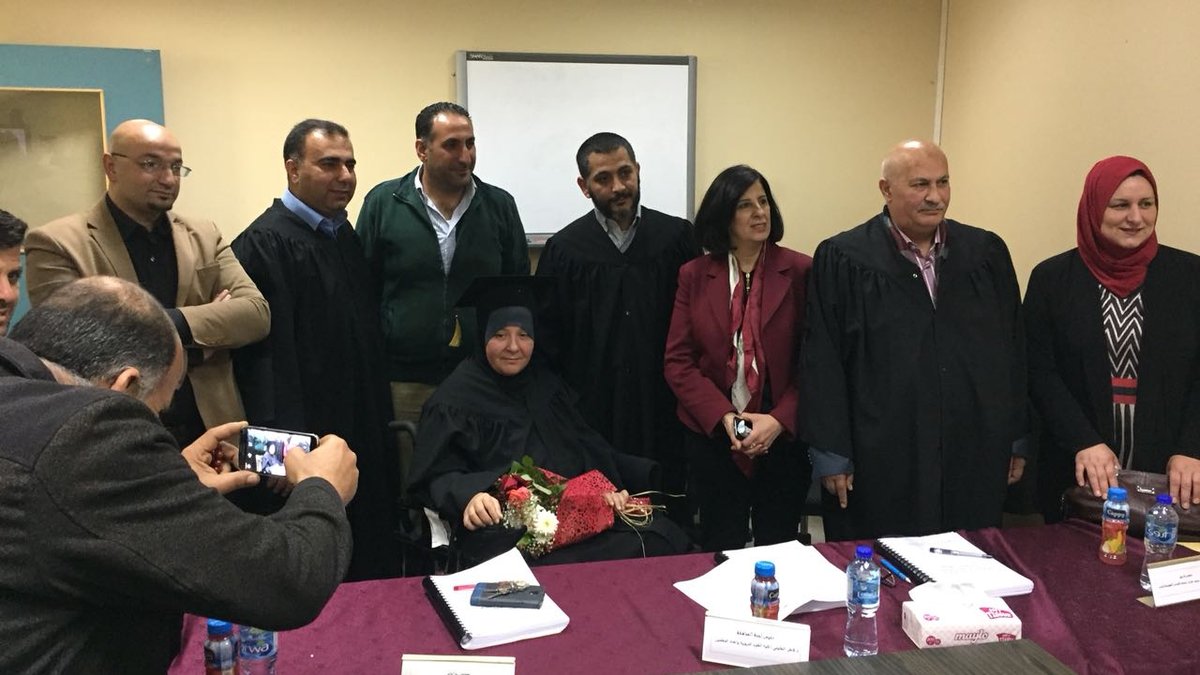
The Faculty of Graduate Studies awarded the researcher Raeda Marwan Freatikh a Master’s Degree in Psychological and Educational Counsling in response to her thesis entitled “Marital Stability and its Relationship with Marital Forgiveness and Communication Patterns Based on Virginia Satir Model among the Couples in the Northern Governorates in the West Bank”.
This study aimed to identify the levels of marital stability, marital forgiveness, and marital communication patterns based on Virginia Satir model; those are blaming, placating, computing, and distracting among the couples in the northern governorates in the West Bank. Furthermore, the study discovered the interrelationships among marital variables. The study tried also to test the effects of some demographic variables (gender, age, marriage period, governorate, number of children, place of residence, and educational level) in marital communication patterns, marital stability, and marital forgiveness.
To achieve the purposes of the study; the researcher built three instruments to collect the data and measure marital communication patterns, marital stability, and marital forgiveness. The validities and reliabilities were checked through a pilot test implemented before the actual distribution and the results supported implementation of the instruments. The populations consisted of couples in the northern governorates in the West Bank. On the other hand, the sample was convenience sample and it consisted of (200) married persons (100 spouses) where the sampling unit were the couples in Nablus, Tulkerm, Jenin, Qalqilia, Tubas, and Salfeet.
The researcher used SPSS software to analyze the collected data. Frequencies, percentages, means, standard deviations, and on sample t-test were used to assess the levels of marital communication patterns, marital stability, and marital forgiveness. Repeated measures and Wilks Lambda were used to test the significance of differences among communication patterns, moreover Sidak test for correlated data was used too. MANOVA test was used to check the effects of gender, age, marriage period, governorate, number of children, place of residence, and educational level in marital communication patterns, marital stability, and marital forgiveness. Pearson correlation coefficients and multiple linear regression by stepwise method were used to test the correlations among dependent study variables and to test the effects of marital communication patterns and marital forgiveness in marital stability for each spouse and for all sample, and the results were the following:
- The levels of marital stability and forgiveness were high.
- The levels of blaming, placating, and distracting communication patterns were low; meanwhile the level of computing communication pattern was high.
- There were negative significant correlation between blaming communication pattern and marital stability (r = -0.74, α < 0.05), which means if the spouses tend to use blaming communication pattern the marital stability will decrease and vice versa. There were negative significant correlation between blaming communication pattern and marital forgiveness (r = -0.84, α < 0.05), which means if the spouses tend to use blaming communication pattern the marital forgiveness will decrease and vice versa.
- There were negative significant correlation between distracting communication pattern and marital stability (r = -0.79, α < 0.05), which means if the spouses tend to use distracting communication pattern the marital stability will decrease and vice versa. There were negative significant correlation between distracting communication pattern and marital forgiveness (r = -0.80, α < 0.05), which means if the spouses tend to use distracting communication pattern the marital forgiveness will decrease and vice versa.
- There were positive significant correlation between marital stability and marital forgiveness (r = 0.88, α < 0.05), which means if the spouses tend to be stabile in their marriage the marital forgiveness will increase and vice versa.
- Marital forgiveness and distracting communication pattern could predict marital stability, where marital forgiveness could explain (78%) of the variances in marital stability and distracting communication pattern could explain (2%) of the variances in marital stability.
- Wives tend to use placating communication pattern more than husbands, meanwhile husbands tend to use blaming and computing communication patterns more than wives.
- Marriage period had impact on blaming communication pattern at significance level of (α = 0.01) where the rest of communication patterns were not affected. Where, spouses who married for less than (10) years tend to use blaming communication pattern more than spouses who married for more than (10) years.
- Marriage period had impact on marital stability at significance level of (α = 0.01) Where, spouses who married for more than (15) their marriages are more stable.
- Marriage period had impact on marital forgiveness at significance level of (α = 0.01). Where, spouses who married for more than (15) are more forgiving.
- Number of children had impact on blaming and placating communication patterns at significance level of (α = 0.01). Meanwhile Number of children had not effects on the rest communication patterns, marital stability, and marital forgiveness. Where, small family size tends to use placating communication pattern more than other families and big family size tends to use blaming communication pattern more than other families.
Based on the results, the researcher recommends that, it is necessary to family counselors and therapists interesting in decreasing blaming and distracting communication pattern among spouses since they are affecting marital stability and forgiveness which in turn decreasing divorce rates, emotional divorce, and marital conflicts. Furthermore, it is important encouraging husbands to use placating communication pattern when they communicate with their wives since it affects marital stability and forgiveness positively.
The committee consisted of: Dr. Fakher Khalili as a main supervisor and Chairman, Prof. Yousef Deyab as an external examiner and Dr. Fayez Mahamid as an internal examiner.
At the end of the session, the committee approved the success of the researcher and recommended her a Master’s degree.
عدد القراءات: 403





